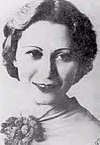Julia de Burgos
| Julia de Burgos | |
|---|---|

Julia de Burgos
|
|
| Born | Julia Constancia Burgos García February 17, 1914 Carolina, Puerto Rico |
| Died | July 6, 1953 (aged 39) Manhattan, New York, United States |
| Occupation | poet, activist |
| Nationality |
|
| Literary movement | Puerto Rican Independence |
| Notable works | El Rio Grande de Loiza; |
|
|
Julia de Burgos (February 17, 1914 – July 6, 1953) was a poet from Puerto Rico. As an advocate of Puerto Rican independence, she served as Secretary General of the Daughters of Freedom, the women's branch of the Puerto Rican Nationalist Party. She was also a civil rights activist for women and African/Afro-Caribbean writers.
Julia de Burgos (birth name: Julia Constanza Burgos García) was born to Francisco Burgos Hans (a farmer) and Paula García de Burgos. Although her father worked for the National Guard and farmed near the town of Carolina, Puerto Rico, where she was born, the family later moved to the barrio of Santa Cruz of the same city. She was the oldest of thirteen children, and six of her youngest siblings died of malnutrition. Her first work was Río Grande de Loíza. According to Burgos:
"My childhood was all a poem in the river, and a river in the poem of my first dreams."
After she graduated from Muñoz Rivera Primary School in 1928, her family moved to Rio Piedras where she was awarded a scholarship to attend University High School. In 1931, she enrolled in University of Puerto Rico, Rio Piedras Campus to become a teacher.
In 1933, Burgos graduated at the age of 19 from the University of Puerto Rico with a degree in teaching. She became a teacher and worked at Feijoo Elementary School in Barrio Cedro Arriba of Naranjito, Puerto Rico. She also worked as writer for a children's program on public radio, but was reportedly fired for her political beliefs. Among her early influences were Luis Lloréns Torres, Clara Lair, Rafael Alberti and Pablo Neruda.
In 1934, she married Ruben Rodrigues Beauchamp and ended her teaching career. In 1936, she was a member of the Puerto Rican Nationalist Party (Partido Nacionalista de Puerto Rico) and elected Secretary General of the Daughters of Freedom, the women's branch of the Nationalist Party. The Puerto Rican Nationalist Party was the independence party headed by Pedro Albizu Campos, a Puerto Rican Nationalist. She divorced her husband in 1937.
...
Wikipedia
